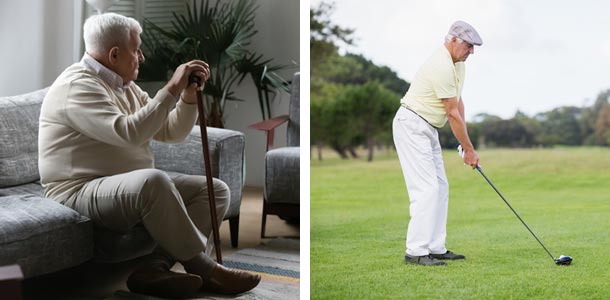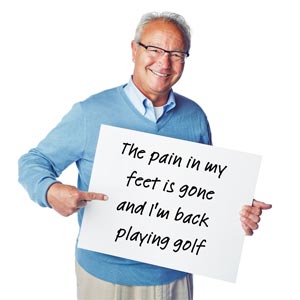Your Neuropathy Diagnosis does not define you!
Our goal is to help you get from
![]()


You may have seen us or heard us on:

Click the videos below to get to know Dr. Rorick

 How Neuropathy Disrupts an individual’s life physically & Emotionally
How Neuropathy Disrupts an individual’s life physically & Emotionally
- Pain & Discomfort
- Sleep Disruption which makes it hard to heal & feel well
- A feeling of isolation
- Not being able to participate in things that are important to them
- Fear of falling & progression of their condition
- Embarrassment
- Stress, Anxiety & Depression
Common Neuropathy Symptoms individuals suffer with:
Generally, symptoms of peripheral neuropathy in an affected area include:

- Numbness/Tingling
- Burning Pain
- Unusual and/or loss of sensations
- Muscle weakness
- Deep Stabbing Pain
- Balance Problems
- Diabetic nerve pain
- Sharp, electric-like pain
- Burning or tingling
- Numbness or muscle weakness
- Difficulty sleeping from leg discomfort
- Sensitivity to touch
- Pain when walking
How Neuropathy Progresses
Nerve deterioration from peripheral neuropathy weakens the connected muscles. That can cause paralysis, which may cause difficulty moving the toes, foot drop, and hand weakness. Weakness can also affect muscles in the thighs, arms, and elsewhere causing muscle atrophy.
The 5 Stages of Peripheral Neuropathy
Stage 1: Numbness and Pain
 In the beginning stages of neuropathy, an individual generally begins to experience some pain and numbness. These symptoms won’t be persistent at first, but the individual will notice them coming and going. These first symptoms of pain and numbness may be subtle, but often the individual will recognize that symptoms are occurring. For example, they may notice some slight tingling or numbness in their hands and feet, that eventually goes away and resolves. Another early sign of neuropathy may be that they notice their balance and reflexes are a little out of tune compared to what they normally are. Oftentimes, the first symptoms recur every few weeks and grow to become more consistent. It is common for people to ignore the first signs of neuropathy because they are so subtle.
In the beginning stages of neuropathy, an individual generally begins to experience some pain and numbness. These symptoms won’t be persistent at first, but the individual will notice them coming and going. These first symptoms of pain and numbness may be subtle, but often the individual will recognize that symptoms are occurring. For example, they may notice some slight tingling or numbness in their hands and feet, that eventually goes away and resolves. Another early sign of neuropathy may be that they notice their balance and reflexes are a little out of tune compared to what they normally are. Oftentimes, the first symptoms recur every few weeks and grow to become more consistent. It is common for people to ignore the first signs of neuropathy because they are so subtle.
Stage 2: Regular and Persistent Symptoms
The second stage of peripheral neuropathy occurs when the individual’s pain and numbness become more regular and consistent. It is difficult to pinpoint exactly when a patient’s neuropathy progresses into the second stage, but it will become obvious when the pain and numbness is felt more often than in the past. In the second stage, it becomes more difficult to ignore the pains, numbness, and other symptoms that are present. This is the stage in which many people recognize that something may be wrong and seek help from a doctor. In most cases, if neuropathy is caught and treated by the second stage, the chances of curing the nerve damage is high, but if left untreated past the second stage, nerve damage is often permanent.
Stage 3: Debilitating Pain
In the third stage of neuropathy, an individual’s pain is typically occurring daily, or almost every day. In this stage, the pain begins to affect their daily activities and prevents them from going about their day as they would normally. At this point, they may realize that over-the-counter pain medications are not working anymore, and they can’t find a way to alleviate their pain. This is because, in the third stage of neuropathy, an individual is likely experiencing other pains and symptoms of nerve damage. In the third stage, there is still a chance that some of the nerve damage can be reversed, but in many cases may be permanent.
Stage 4: Constant Numbness
In the fourth stage of neuropathy, an individual’s legs and feet will become very numb. This is due to the lack of healthy nerves that are able to carry signals to your brain. They may notice an increase in numbness and a decrease in your pain, which becomes more and more concerning. When this happens, it is a sign that the nerves are dying, and a good majority of the nerve fibers have disintegrated. At this point, the larger nerve fibers are beginning to become irreversibly damaged. In this stage, it is likely that an individual’s balance is affected, and it may become difficult to walk and keep their balance. In the fourth stage of neuropathy, the nerve damage is permanent, and much of the numbness will be irreversible. At this stage, it is urgent to seek treatment in order to prevent worsening numbness that cannot be reversed. In the fourth stage, there is still a chance for improvement, but it may be slight.
Stage 5: Complete Loss of Feeling
This is the final stage of neuropathy, and it is where an induvial has lost any and all feeling in their lower legs and feet. They do not feel any pain, just intense numbness. This is because there are no nerves that are able to send signals to your brain. At this stage, walking has become very difficult, and their balance is severely affected. They may become so unsteady that they have to use a wheelchair. It is absolutely necessary that you seek immediate medical attention if you reach this stage of neuropathy, and are experiencing a complete loss of feeling in your lower extremities. In stage five, your nerves are permanently damaged, but it may be possible to regenerate some of your nerve fibers.
When it comes to Peripheral Neuropathy, the most commonly affected areas are the hands and feet, but symptoms may be felt in many other areas, such as the back, legs, and face. If you are experiencing any of the symptoms or feelings that are listed above, contact your doctor immediately. To learn more about Select Health and the treatment options we offer for your Neuropathy, click here! Visit our Facebook page for all of the latest updates and information about us and our services.
Our Approach with Neuropathy
At our Institute we believe in combining both medicinal and non-medical treatments as both can be important and needed. In addition to medical treatments, alternative therapies can also play a valuable role in optimizing patient outcomes. By considering all of the factors on an individualized basis, healthcare providers can provide more personalized care and help patients achieve their health goals. It’s also important for healthcare providers to be humble and empathetic in their interactions with patients, recognizing that each patient is unique and may have different needs. Overall, a patient-centered, collaborative approach to healthcare can lead to better outcomes and improved quality of life for patients to combine what is best for each individual patient. We also co-manage many patients with their existing doctor that has been managing their care.
Did you know that there are Non-Medication Treatment options for Neuropathy and Chronic Nerve Discomfort that are Available?
Peripheral neuropathy can be life-altering and debilitating. It is a condition where nerves are damaged causing weakness, burning pain, numbness, tingling, and debilitating balance problems. The damage to the nerves can be caused by many different problems in the body. Poor blood flow to the nerves, toxic levels of sugar in the blood (diabetes), chronic infections, pesticide exposure and genetic variants are a few of the causes of this debilitating condition. The cause of this condition is different for every patient, and it must be discovered to help the nerves heal.
Can peripheral nerves heal?
There is hope and good news! Fortunately, it is well established in the scientific literature that peripheral nerves do have the ability to heal in many cases. It is very important that not only do we need to get the nerves healing but we have to stop whatever is causing the nerve damage in the first place. When the underlying cause of the neuropathy is discovered and proper support for the nerves are provided it optimizes chances and the ability for the nerves to have an opportunity to begin to heal.
In order to effectively start the journey to heal nerve damage, four factors must be determined:
What is the underlying cause of the nerve damage?
How severe is the nerve damage?
What types of nerve fibers are damaged?
You have sensory nerves (both small fiber nerves and large diameter nerves) and motor nerves (that control movement of your muscles) NOTE: If there is muscle weakness from neuropathy for greater than two years the damage to the muscles will probably be permanent!
How much treatment will the nerves require to heal?
This will be dependent on the degree of nerve damage and what types of fibers are damaged.
The treatment we provide has four main goals…
Optimize the environment within the body for nerve healing.
Increase blood flow to the nerves.
Stimulate the nerves that are damaged (small fiber, large diameter, or motor nerves) to reduce pain and improve balance.
Our exclusive treatment system increases blood flow to the nerves in the feet and/or hands, which helps to rejuvenate nerves naturally and has returned many of our patient’s feet and/or hands to normal (see testimonials below). No surgery. No addictive medications.
Our proprietary and comprehensive treatment program is customized for each patient based on their needs. We utilize the highest quality, state-of-the-art technologies and treatments and is likely to be unlike any treatment program you may have already experienced.
We provide a Safe and Effective, New Choice for Neuropathy Sufferers.
Our clinic offers a NEW, Non-Invasive and Non-Surgical therapy protocol that combines the best of cutting-edge medical treatments to help resolve your neuropathy suffering. We want to make sure that you have the confidence that you need, so we’ve designed an extensive diagnostic evaluation process to help us find out if you’re a candidate for our program.
This extensive evaluation will give you ALL the information that you need to know before starting treatment so you can be assured if you will have success with your neuropathy pain program.
You matter to us!
We care about you living your happiest & healthiest life.
Call Now 281-496-3355
